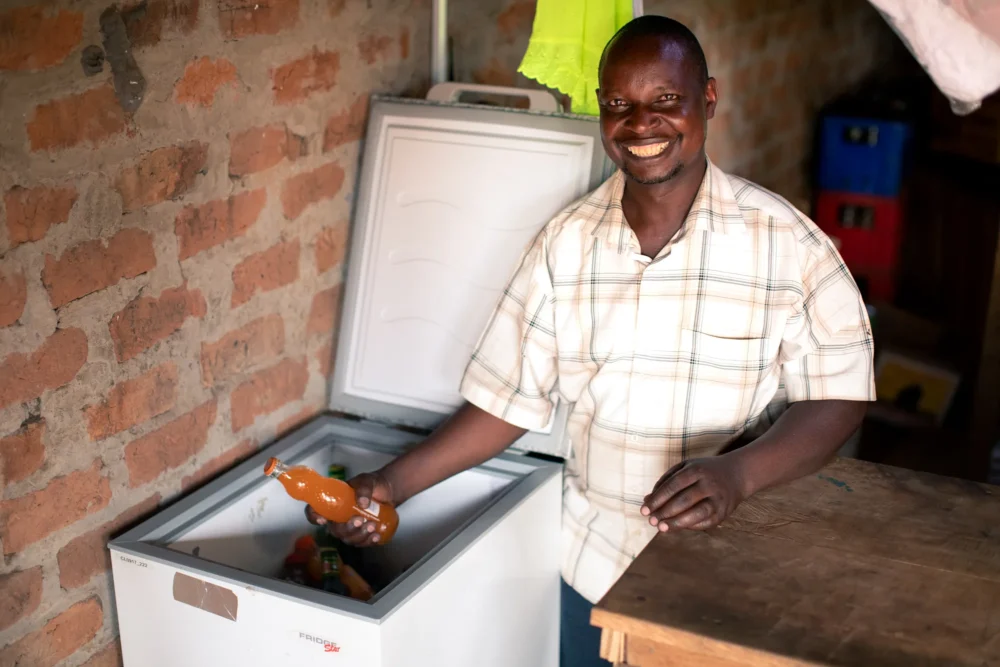Everyone Gathers Here in the Evening
We share the inspiring story of Shabani Kalire, a local shopkeeper in Kerekereni, Uganda. He highlights how his shop earnings doubled since receiving a solar fridge as part of the Global LEAP programme.

To anyone driving through on a hot, dusty afternoon, the small trading centre of Kerekereni, in eastern Uganda, looks like nothing more than a sleepy backwater. Stray livestock meander among the scattering of low concrete buildings, where handfuls of men can be seen lounging under the eaves. But as darkness falls Kerekereni comes alive, as dozens of street vendors arrive to sell vegetables, nuts and fried snacks to the hundreds of people who flock here each night, looking to buy supplies, do business or simply catch up with their neighbours.
It wasn’t always like this. According to Shabani Kalire, a local shopkeeper, Kerekereni used to empty out at dusk. What changed things, he says, is that earlier this year he and two other shopkeepers were chosen by CLASP to help test solar refrigerators as part of the Global LEAP programme, which requires rigorous field testing of clean energy products in order to determine which perform best.
Each of the three Kerekereni shops received a solar fridge, two solar light bulbs, solar panels and three batteries, all of which now belong to them. In eastern Uganda solar fridges are not yet widely available, and none of the recipients had ever seen one before. But their arrival has been transformational, both for the businesses themselves and for the community they serve.
Kalire explains that he now makes nearly twice as much money from his shop as he used to. People come to buy a drink, he says, and stay to buy other things as well. Before the refrigerators his customers weren’t interested in buying water, but now he sells bottles of mineral water and plastic bags of drinking water he fills himself. Clusters of local men can be seen outside his shop every afternoon, chatting on wooden benches and sipping cold drinks. It has become a gathering place for the local community.
People want soda to be cold because when you take a cold one, you feel that life is good, says Kalire. The area around Kerekereni is dominated by hard-working farmers, he adds, for whom a cold drink at the end of the day is a real treat. Customers are coming in great numbers, and we make sales. The fridges have really brought change.

To Kalire, who has six children to support, the extra income is more than welcome. But other traders have capitalized on it as well. Drawn both by the availability of cold drinks and by the new solar lights outside each shop, street vendors began appearing in the evenings, transforming the quiet trading center into a bustling night market providing business opportunities for dozens of people.
Ever since we got solar energy, our trading centre has been far ahead of other trading centers. Everyone gathers here in the evening, says Godfrey Kirya, one of the other shopkeepers selected for the test.
So many people come. We all make sales.
Another sector the refrigerators have stimulated is the solar sector, says Kalire. Although practically no one used solar lights before, he says, I know of many people on this street who have now bought solar bulbs, and they are working. He adds that a number of his neighbours would be willing to buy their own solar fridges as well, if they were available locally.
Being part of the Global LEAP test has also convinced Kalire himself that solar products are the best way to grow his business. “I want to add another solar fridge here, because sometimes, during the festive season, one fridge is not enough”, he explains. He also plans to buy a solar TV, which he can use to screen football matches and films.
These days you cannot sell someone a soda or a juice that isn’t cold. They won’t accept it, he laughs. People are happy. There’s been great development in the area.
Kirya agrees. We’ve had serious improvement, he says. I can see it myself.
***
About the Global LEAP Awards
The Global LEAP Awards is an international competition to identify and promote the world’s best off-grid appliances, accelerating market development and innovation. This unique programme has evolved into a trusted global brand that serves as the de facto source of accurate, actionable information about the quality and energy performance of off-grid appliances, with support from Power Africa, UK aid, Energising Development, Powering Agriculture, and USAID, and in partnership with the Efficiency for Access Coalition which is co-chaired by the IKEA Foundation and UK aid.